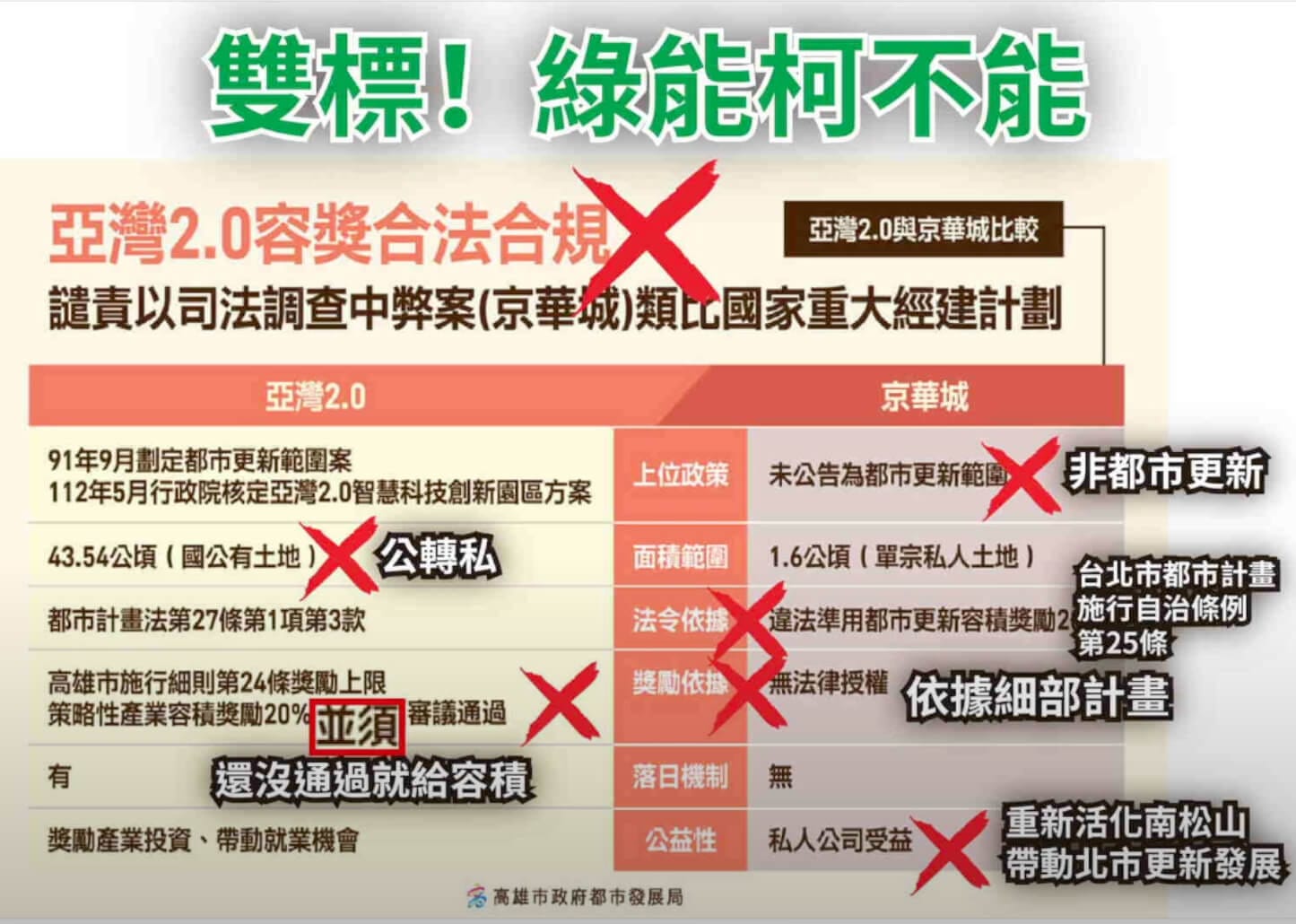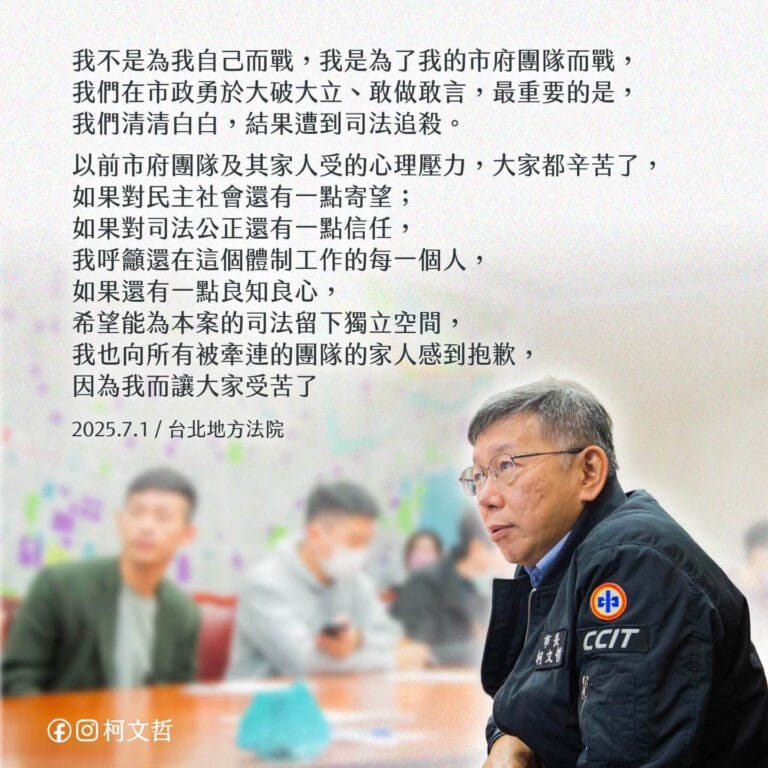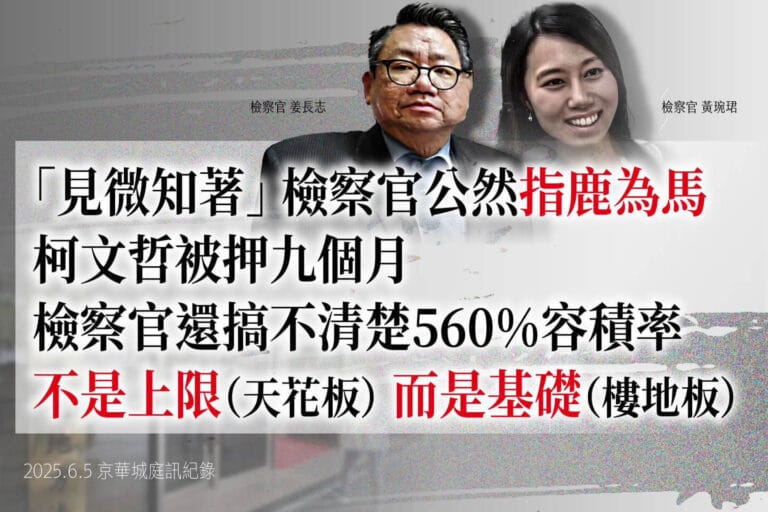Updated time: 2025-05-18, AM 05:13 (GMT+8) post history
The fault isn't in the explanation — it's the deliberate choice not to tell the truth.
Today, we witnessed with our own eyes how a sitting Deputy Mayor of Kaohsiung, Lin Chin-Jung, used his so-called “professional bias” to repeatedly misapply regulations, steer courtroom narratives, and mislead the public.
Lin came fully prepared. When questioned by the prosecutor, he answered everything, even what he didn’t truly understand—long-winded and repetitive.
But once other defense attorneys took the floor, his answers became: “I don’t know,” or a dismissive shrug: “Go check it yourself.” His tone was arrogant, and he repeatedly misled the court by claiming:
“Administrative agencies cannot issue administrative dispositions on floor area ratios.”
This was flatly refuted by a letter from the Ministry of the Interior:
“Administrative agencies do have the authority to determine floor area ratios.”
At the beginning of cross-examination, the prosecutor brought out a “May 13, 2017 morning meeting record” that Lin himself had voluntarily provided to investigators. From that point, the two engaged in a seemingly coordinated dialogue.
Prosecutor: “So, what does the conclusion of this meeting record mean? I don’t really get it… What does it mean to make an administrative disposition on a base floor area ratio? I’m not quite sure I understand…”
Lin Chin-Jung: “The mayor’s idea was to decide whether Core Pacific City’s floor area ratio should be 392%, 560%, or 120,284 square meters, and make it an administrative disposition after taking in opinions from various parties… Then, after analysis, issue the disposition, announce it online, and track it for three months.”
Prosecutor: “I still don’t get it… Is it even allowed to make an administrative disposition?”
Lin: “That’s exactly what I just said… In 2016, there was a constitutional interpretation… so the head of the Urban Development Bureau, Lin Jou-Min, was obviously just refusing to comply.”
Their back-and-forth firmly planted a notion in the courtroom:
That it would be illegal for the city government to unilaterally determine the floor area ratio by administrative disposition.
But just over an hour later, under cross-examination by the lawyer representing Sheen Ching-Jing, Lin abruptly changed his stance.
Sheen’s lawyer:
“But when the Control Yuan corrected the Taipei City Government and held Hau Lung-pin accountable for illegally determining the FAR, the city was instructed to review and correct it. Taipei City then wrote to the Ministry of the Interior to ask how the FAR for Core Pacific City should be determined. Didn’t the Ministry clearly respond that ‘the authority to determine FAR lies with the administrative agency’—meaning the Urban Development Bureau?
So when Ko Wen-Je publicly ordered that the FAR be clarified, was he wrong?”
Lin Chin-Jung immediately backpedaled:
“I never said he was wrong.”
The truth is, Lin clearly knew that the Control Yuan had reprimanded the Hau Lung-pin administration for its illegal miscalculation of Core Pacific City’s FAR—causing real harm to the developer.
The next administration had an obligation to correct this mistake, or it would be infringing on private property rights. At that time, Urban Development Director Lin Jou-Min even sent another inquiry to the Ministry, and the response was:
“Stop passing the buck—Taipei City has the authority to determine the floor area ratio.”
Lin knew the entire sequence of events and institutional process, yet he deliberately exploited information gaps to confuse the court and create the impression that Ko Wen-Je had unlawfully protected the developer.
The ones truly at fault were Lin Jou-Min—who was corrected by the Control Yuan and urged by the Ministry to fix the problem but stubbornly refused—and Lin Chin-Jung himself.
Had Ko Wen-Je followed the advice of these two, it would have been a case of abusing authority, violating the law, and oppressing the people.
Taipei City might have faced another censure—or even an impeachment case.
Original URL: https://www.facebook.com/share/p/15MxNGWUG2/
How do double standards shape political persecution?
Lin Chin-Jung gets a pass. Peng Chen-Sheng does not. Chen Chi-Mai is allowed. Ko Wen-Je is not.
Just moments ago in court, Lin Chin-Jung openly admitted:
The Kaohsiung City Government—where he currently serves—granted a 20% floor area ratio for the Asia Bay Economic and Trade Park development plan. That’s even higher than what Core Pacific City had requested, and quadruples the legal cap of 5%.
And there’s no legal basis for it.
So let us ask Deputy Mayor Lin, the self-proclaimed professional:
Isn’t this exactly what you loudly declared this morning—”Every extra square meter is suspected of profiteering”?
All day, Lin insisted that since Core Pacific City was still in litigation with Taipei City, the government could not accept petitions or adjust the FAR.
He found it “unbelievable” that under Ko Wen-Je’s administration, the case was even reviewed by the Urban Planning Commission.
But then came the bombshell:
A lawyer for former Urban Development Director Huang Ching-Mao revealed that under Lin’s own tenure, Core Pacific City was also suing the city to raise its FAR from 392% to 560%.
And what did Lin do?
He accepted three petitions, hosted two coordination meetings, and even issued a directive to submit the case to the Urban Planning Commission for consensus-based resolution.
In other words, Lin Chin-Jung did exactly what Peng Chen-Sheng was accused of.
The only difference?
No one falsely accused him. No one framed him.
And Lin didn’t stop there.
He practically started writing his own laws, as if he were a Constitutional Court justice.
In court, Lin admitted that the current Chief Engineer of Taipei’s Urban Development Bureau, Yang Chih-Sheng, and former Chief Engineer Shao Hsiu-Pei—now a defendant—are both more professionally qualified in urban planning than he is.
Both testified:
“Detailed plans can grant floor area ratio incentives.”
Even Prosecutor Lin Chun-Yen said during questioning:
“I believe detailed plans can provide FAR bonuses.”
But Lin Chin-Jung alone insisted:
“I don’t think they can.”
He spent the entire day parroting the same line:
“Floor area ratio incentives must be issued under the master plan.”
At least five urban planning experts have already debunked that claim.
In fact, we even found written evidence from a special report presented to the Taipei City Council on May 17, 2012, during Hau Lung-pin’s term as mayor.
In that report, then-Urban Development Director Ting Yu-Chun clearly stated:
“Taipei’s land-use zoning operates under a dual-track system.
General land follows the Land Use Self-Governance Ordinance.
Special zones follow urban planning procedures—
and detailed plans can indeed establish floor area ratios.”
So we ask again:
Deputy Mayor Lin Chin-Jung, after a full day of courtroom nonsense—where exactly is your professionalism?
Original URL: https://www.facebook.com/share/p/1996WSF5t4/
When I follow national policy, it’s illegal. When you do it, it’s legal. So, who does justice actually serve?
Green Can (DPP) can, but you cannot; Chen Chi-mai can, but Ko Wen-je cannot.
Under Kaohsiung’s Asia Bay Economic and Trade Development Plan, both operational headquarters and corporate headquarters were granted a 20% floor area ratio incentive. But they weren’t supposed to be.
Lin Chin-Jung has consistently insisted:
“Detailed plans cannot grant FAR incentives.”
And yet, the Asia Bay plan—developed under his direct supervision—did exactly that, relying on Kaohsiung’s own detailed plan to provide FAR incentives.
The problem?
That detailed plan only allows 5% FAR bonus for operational headquarters.
Kaohsiung gave four times that—a full 20%—and not even to operational headquarters, but to corporate headquarters, which aren’t legally recognized in the same category.
This is the same Lin Chin-Jung who loudly declared:
“FAR is a public asset. Every extra square meter is profiteering for corporations.”
And in court, he shouted:
“Who stole the cheese from the people of Taipei?!”
So we ask you, Deputy Mayor Lin:
What legal basis allowed you to award three times the permitted bonus to Asia Bay?
Who stole the cheese from the people of Kaohsiung—was it you, or was it Mayor Chen Chi-Mai?
The Cross-Examination: Lawyer Cheng Shen-Yuan and a Convenient Prosecutorial Assist
Cheng (Ko Wen-Je’s attorney):
“You keep emphasizing that FAR incentives must have legal authorization and cannot be granted directly through detailed plans—is that correct?”
Lin:
“My point is that if a detailed plan grants it, it must be based on higher-level urban planning and legal authorization.”
Cheng:
“Please look at the detailed plan issued by the Kaohsiung City Government in October 2023. Was this revision made during your tenure, and passed under your chairmanship of the Kaohsiung Urban Planning Commission?”
Lin:
“Yes. But how is that relevant to this case?”
Cheng:
“Let’s examine Clause 4 of the [Land Use Zoning Control Guidelines] in this plan. It says FAR and building coverage ratios shall follow the table, and where unspecified, follow the Urban Planning Implementation Rules of Kaohsiung. Doesn’t this imply that this detailed plan’s FAR provisions take precedence over the implementation rules?”
Lin:
“It’s in full compliance with the Urban Planning Act. If it’s for a national policy industry, the FAR can be increased to 20%, just like Taipei’s land use ordinance.”
Cheng:
“I’m asking you: Does this detailed plan provide FAR that overrides Kaohsiung’s implementation rules?”
Lin:
“Yes. It’s fully compliant.”
Cheng:
“On page 286, it states that strategic industries or corporate headquarters can receive a 20% FAR bonus. What’s the legal basis for this?”
Lin:
“Kaohsiung City Urban Planning Implementation Rules.”
Cheng:
“Which specific clause allows you to grant 20%?”
Lin:
“…If you show me the law, I can identify it.”
Cheng:
“Let’s look at Article 24-3, Paragraph 2, Subparagraph 6. It says: ‘If the Ministry of Economic Affairs certifies an operational headquarters, then a 5% FAR bonus may be granted.’ Is this the authorization you were referring to?”
Lin:
“That means you need MOEA certification to get the 20%.”
Cheng:
“But this clause only allows 5%, and only for operational HQs. Where is the clause that allows 20% for corporate HQs or strategic industries?”
Lin:
“It’s a cumulative total.”
Cheng:
“Then please explain how that total is calculated.”
Judge:
“The defense is asking you to list each component that adds up to the 20%.”
Lin:
“For the Asia Bay 2.0 Plan… it’s based on national policy industry needs, plus Kaohsiung’s own industrial development priorities. Combined, this justifies the 20%.”
Cheng:
“But operational HQs can only get 5%, and Asia Bay was for a corporate HQ. You gave it 20%. There’s no such authorization in the rules.”
Lin:
“Read further—total FAR bonuses can’t exceed 20%.”
Cheng:
“Exactly. The cumulative cap is 20%, but the specific allowance for operational HQs is capped at 5%. You didn’t meet the criteria.”
Lin:
“I can’t fully answer right now. But I’m confident it aligns with Kaohsiung’s Urban Planning Implementation Rules.”
Cheng:
“So a detailed plan can grant FAR incentives, as long as it follows legal procedures and is approved by the planning commission?”
Lin:
“It must comply with the implementation rules.”
Cheng:
“Then does this project comply?”
Lin:
“I’ll have to double-check later. But yes—it’s a major national policy.”
Prosecutor (jumping in to help):
“Can a comprehensive urban planning review authorize FAR incentives?”
Lin:
“Yes… but it needs to be confirmed in two stages by the planning commission.”
Prosecutor:
“Has the Asia Bay Plan undergone a comprehensive review?”
Lin:
“It’s currently in progress.”
Prosecutor:
“So these FAR provisions granted by Kaohsiung—have they been finalized in the review?”
Lin:
“They’ll be included… eventually.”
The Takeaway
The Asia Bay development plan is still under review—but Kaohsiung has already granted FAR bonuses four times over the legal limit.
So again we ask:
Who is justice really serving?
Is it bound by law, or does it bend to political convenience?
Original URL: https://www.facebook.com/share/p/1L1cM8v2Yg/

Editor's picture card
The duel between the three former directors of the capital development bureau, Lin Chin-jung - defeated!
Article source: Ko Wen-Je
Don't cooperate with politicians to hype up the volume and distort the profession.
Article source: Taiwan People’s Party
More audio-visual information
The sword of the Qing Dynasty beheaded the officials of the Republic of China
Video source: Zhang Qikai (张启楷)
Hokkai's Secret Weapon Appears!! As a result, it was seen through
Video source: Impolite Townsfolk League
Related Articles:
Updated history
We’ve just released the English version.
New picture - Kaohsiung Metropolitan Development Bureau's rumor-mongering commentary

New video - The sword of the Qing Dynasty beheads the officials of the Republic of China
7k直播 - 聊聊最近做了什麼 feat. @DearNaNa1313


